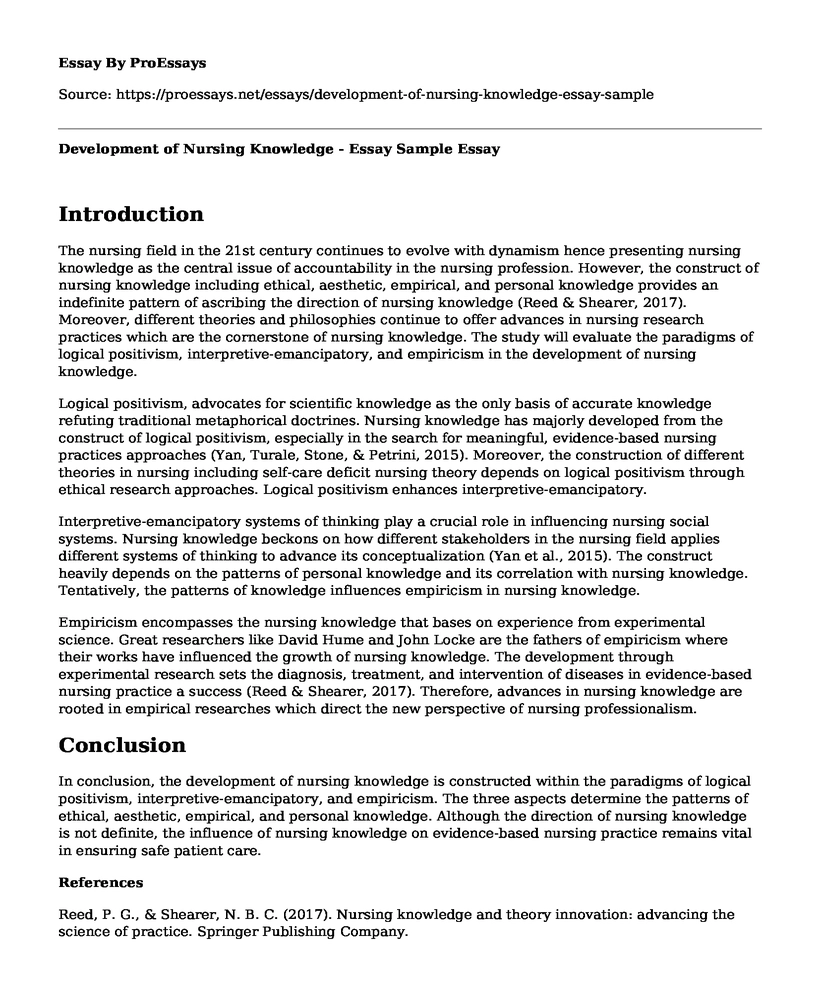Introduction
The nursing field in the 21st century continues to evolve with dynamism hence presenting nursing knowledge as the central issue of accountability in the nursing profession. However, the construct of nursing knowledge including ethical, aesthetic, empirical, and personal knowledge provides an indefinite pattern of ascribing the direction of nursing knowledge (Reed & Shearer, 2017). Moreover, different theories and philosophies continue to offer advances in nursing research practices which are the cornerstone of nursing knowledge. The study will evaluate the paradigms of logical positivism, interpretive-emancipatory, and empiricism in the development of nursing knowledge.
Logical positivism, advocates for scientific knowledge as the only basis of accurate knowledge refuting traditional metaphorical doctrines. Nursing knowledge has majorly developed from the construct of logical positivism, especially in the search for meaningful, evidence-based nursing practices approaches (Yan, Turale, Stone, & Petrini, 2015). Moreover, the construction of different theories in nursing including self-care deficit nursing theory depends on logical positivism through ethical research approaches. Logical positivism enhances interpretive-emancipatory.
Interpretive-emancipatory systems of thinking play a crucial role in influencing nursing social systems. Nursing knowledge beckons on how different stakeholders in the nursing field applies different systems of thinking to advance its conceptualization (Yan et al., 2015). The construct heavily depends on the patterns of personal knowledge and its correlation with nursing knowledge. Tentatively, the patterns of knowledge influences empiricism in nursing knowledge.
Empiricism encompasses the nursing knowledge that bases on experience from experimental science. Great researchers like David Hume and John Locke are the fathers of empiricism where their works have influenced the growth of nursing knowledge. The development through experimental research sets the diagnosis, treatment, and intervention of diseases in evidence-based nursing practice a success (Reed & Shearer, 2017). Therefore, advances in nursing knowledge are rooted in empirical researches which direct the new perspective of nursing professionalism.
Conclusion
In conclusion, the development of nursing knowledge is constructed within the paradigms of logical positivism, interpretive-emancipatory, and empiricism. The three aspects determine the patterns of ethical, aesthetic, empirical, and personal knowledge. Although the direction of nursing knowledge is not definite, the influence of nursing knowledge on evidence-based nursing practice remains vital in ensuring safe patient care.
References
Reed, P. G., & Shearer, N. B. C. (2017). Nursing knowledge and theory innovation: advancing the science of practice. Springer Publishing Company.
Yan, Y. E., Turale, S., Stone, T., & Petrini, M. (2015). Disaster nursing skills, knowledge and attitudes required in earthquake relief: Implications for nursing education. International nursing review, 62(3), 351-359.
Cite this page
Development of Nursing Knowledge - Essay Sample. (2022, Dec 02). Retrieved from https://proessays.net/essays/development-of-nursing-knowledge-essay-sample
If you are the original author of this essay and no longer wish to have it published on the ProEssays website, please click below to request its removal:
- Essay Sample on Hospital Management
- Accidents That Led to Improvements in Aviation Safety Standards
- Mental Illness and the Senior Citizen Essay Example
- SYMDEKO's Mechanism of Action Paper Example
- Importance of Trainings for Nurses - Essay Sample
- Pursuing My Passion: Becoming a Certified Registered Nurse Anesthetist (CRNA) - Essay Sample
- Essay Example on Nurses: Vitals to Social and Public Policy Influencing







